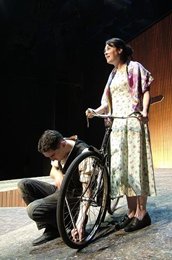Patrick Kavanagh’s semi-autobiographical character Tarry Flynn reveres literature and, like a Romantic poet, fancies himself as a specially-inspired mediator between nature and man. He believes that all ordinary objects and acts can carry within them “the energy of the imagination”. As infuriatingly detached and egotistical as Tarry is, the character’s poetic ideals provided Conall Morrison’s muse when he adapted this work for the Abbey stage in 1996. The result: a work of vibrant theatricality that offers theatre practitioners vast artistic opportunities. Attracted by its fusion of performance styles, director Andrew Flynn has the ideal creative vision for this play.
 Tarry Flynn is set in Cavan in the 1930s. The Town Hall Theatre’s production opens on a dimly-lit enactment of village bustle. Flynn moulds his cast of more than 40 actors (none of them professional) into stylised swarms of activity; this, combined with Adam Fitzsimons’ lighting, imbues the masses with the homogeneity and ritualism that is central to Morrison’s adaptation. Accompanied by Sean Moloney’s traditionally-styled – but wholly original – tribal notes, the introductory procession is punctuated by a series of freeze-frames in which the actors embody portraits of Irish customs such as saving hay and a hurling match. This imagery sets the scene for the way in which Morrison imagines, and displaces Tarry from, the pageant of rural Irish life.
Tarry Flynn is set in Cavan in the 1930s. The Town Hall Theatre’s production opens on a dimly-lit enactment of village bustle. Flynn moulds his cast of more than 40 actors (none of them professional) into stylised swarms of activity; this, combined with Adam Fitzsimons’ lighting, imbues the masses with the homogeneity and ritualism that is central to Morrison’s adaptation. Accompanied by Sean Moloney’s traditionally-styled – but wholly original – tribal notes, the introductory procession is punctuated by a series of freeze-frames in which the actors embody portraits of Irish customs such as saving hay and a hurling match. This imagery sets the scene for the way in which Morrison imagines, and displaces Tarry from, the pageant of rural Irish life.
Tarry (Barry Hopkins) is a lustful young poet, inwardly vain and outwardly awkward, who insatiably craves the affection of girls such as Mary O’Reilly (Orla O’Brien) – with whom he inevitably misses his chance. Reading and privately reciting his poetry, he isolates himself from reality, choosing instead the realm of the imagination. Due to his difference, he haplessly becomes a scapegoat for his hypocritical neighbours, themselves prone to creating drama through exaggeration. It is difficult not to sympathise with this non-conformist underdog, though his detachment is exasperating. Barry Hopkins’ portrayal of Tarry – mopey, forlorn and unsmiling – illustrated the character’s lack of fulfilment, but also made his demeanour all the more frustrating.
Owen MacCárthaigh’s minimalist set, depicting bevelled crossroads, was both versatile and evocative. While it was plain enough to take on the quality of a yard or a room, the curved appearance of the roads, each sloping downward, gave the stage a sense of circularity. This added to the sense that Tarry’s community is bound by cyclical routine and conventionality.
.jpg.aspx%3Fwidth=260&height=173) Tarry’s neighbours are imbued with a seemingly uniform rectitude; however, this belies a one-upmanship in which even the animals (hilariously played by actors such as Conor Geoghegan) are engaged. Combining narration, song, dance, poetry, prayer and choreographed animals, performance is a central theme of this work. With nearly double the cast of the original production, Flynn capitalises on the play’s theatricality in ways that set Tarry even further apart from the group.
Tarry’s neighbours are imbued with a seemingly uniform rectitude; however, this belies a one-upmanship in which even the animals (hilariously played by actors such as Conor Geoghegan) are engaged. Combining narration, song, dance, poetry, prayer and choreographed animals, performance is a central theme of this work. With nearly double the cast of the original production, Flynn capitalises on the play’s theatricality in ways that set Tarry even further apart from the group.
Juxtaposed against Tarry’s solitary musings are the performative practices in which the community participates, such as gossiping, a mock trial regarding Tarry’s “attack” of Joe Finnegan (John McHugh) and, of course, mass. Flynn’s direction amplifies the sameness of the parish members in order to illuminate Tarry’s difference. For example, the actors enter the church in slow, uniform movements accompanied by haunting flute music. Even the sign of the cross appeared as a choreographed motion.
Playing Father Daly, Gerry Feguson embodied dictatorial self-righteousness. Condemning from the pulpit “scoundrels” such as Tarry, Ferguson’s booming voice simultaneously conveys the power of the church and adds to the humour of these scenes. Having ever-so-gentle hymn singing follow one of his most vitriolic speeches, furthers the work’s satire on Catholicism.
Among its witty highlights, Tarry Flynn offers a feast of Hiberno-English figures of speech. As he and Tarry discuss women, Eusebius (Damien McDonnell) comments: “I could feel her eyes on me like indigestion.” Playing Tarry’s mother, Mary McHugh truly enlivens the production with her perfectly-timed delivery of such lines as “she’s within a kick in the arse of thirty”.
With its song, dance and vignettes of Irish customs, this play teeters on the brink of the sort of canned Irishery tourists would relish. Yet, Morrison’s writing evades such potential superficiality by inviting us to ponder conformity, routine and the ubiquitous nature of theatricality in Irish culture. Guided by Flynn’s expressive direction, the obvious passion of Galway’s community of volunteers maximised this effect.
Siobhán O’Gorman is currently completing a doctoral research project on gender and the canon in contemporary theatre at the National University of Ireland, Galway.